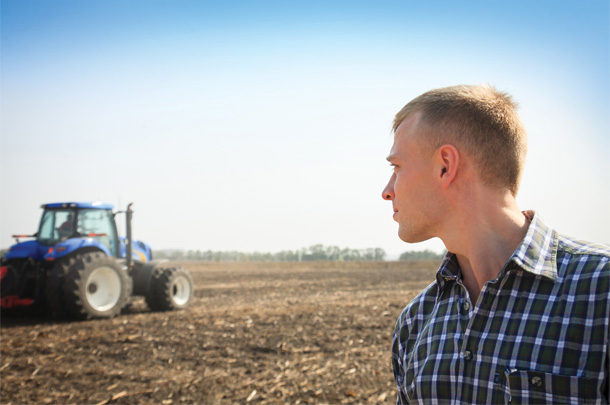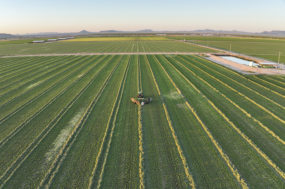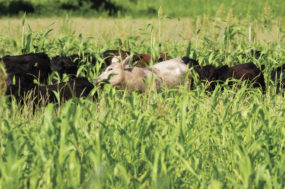Cuts, scrapes and slivers are unavoidable for all who work in agriculture. Most of us were taught to “rub some dirt on it” and get back to work. That method can be helpful for small nicks, but we cannot expect it to work on every injury. Most of us would not expect a person with a broken femur to jump up and continue working. However, we often expect this of ourselves as we struggle with mental health. I don’t need to tell you all the stressors that come with being an agriculturalist, but it is important to know that you are not alone. Many of us face depression, anxiety and other mental illnesses. These are natural responses to extended stress, chemical imbalances, past experiences and more. Ignoring mental health concerns is like letting an infection fester; it won’t get better on its own, and simple treatments become less effective as more time passes.
To start, you do not necessarily have to seek help from a licensed therapist. I personally think that therapy can be very beneficial for everybody, regardless of mental health status. But if talking to a therapist feels too foreign, unfamiliar or uncomfortable, begin by talking with someone you trust. Sharing your fears with those who care can help you see your ability to face them. The person you talk to – whether it is a mental health professional or not – will not have all the answers but will be able to support you. Remembering you are connected to other people and that they care about you may have a greater impact than you can imagine.
Know that government officials are also aware of your concerns, and they are working to create helpful resources. In a recent Twitter livestream hosted by the USDA, Deputy Secretary Jewel Bronaugh, Farm Service Agency (FSA) Administrator Zach Ducheneaux and others discussed steps the USDA is taking to provide farmers with the support they need. Deputy Secretary Bronaugh discussed the renewal of the Farm and Ranch Stress Assistance Network (FRSAN) by the 2018 Farm Bill and the resources being made available through FRSAN.
Under this support, four regional groups were awarded grants to provide resources to agriculturists in their regions. The goal of these groups is to give producers the help they need specific to their area. “You can travel across the United States and there are differences,” says Don McMoran, program director for the Western Regional Agricultural Stress Assistance Program. “Me being from Washington state, I don’t want to be telling these people from other parts of the country how to go about mental health. I think it needs to come from the grassroots efforts.”
Each program strives to meet the needs of the producers in their area. For example, through FRSAN funding and in collaboration with key partners in the region, the National Young Farmers Coalition leads a network in the Northeast called Cultivemos. Their vision statement reads, “Cultivemos envisions a future where diverse farming and ranching communities in the Northeast are seamlessly connected to accessible, culturally competent, timely and effective mental behavioral health care and stress assistance programs that support the well-being and livelihoods of agricultural producers, workers and their families.”
These regional groups are creating new resources and programs for producers and strengthening the programs they already have. “A hotline dedicated to addressing all farm-related issues, as well as a comprehensive website with an exhaustive listing of resources and trainings dedicated to addressing the root causes of stress,” are two new resources Southern Region FRSAN Principal Investigator Heather Sedges, Ph.D., was excited to share. Many regions have similar resources and more including podcasts, videos and newsletters. (To find out more about the resources available in your region, see the infographic.)
The USDA also realizes that it can be difficult to apply for funding opportunities. “We’re working at streamlining these processes,” says Ducheneaux. “That will not only benefit our producers and make that approach to that local office easier, but it’ll also free up some time for conversations with our local office staff that can just be about the family – can be about the weather, about the sports team – so that the entire interaction isn’t taken up filling out a form that maybe neither of us can make heads or tails of.”
Mental health struggles are not something to be ashamed of. “I want producers to know they are not alone,” says Dr. Josie Rudolphi, co-director of the North Central FRSAN. “Asking for help is challenging but the strongest thing someone can do. We have a number of resources and services that are available to help. To those who support agricultural producers (either as friends, partners or colleagues), offer help when you know someone is struggling.”
6 signs to watch for:
1. Change in routine
2. Decline in care of farm and/or livestock
3. Change in mood (anxious, agitated, angry)
4. New or increased financial pressures
5. Loss of interest in hobbies or activities
6. Giving away prized possessions (“I want you to have my prized X, because I’m not going to be here much longer.”)
If you notice a family member or friend showing these signs, take the time to talk with them and help them find resources that may help.










